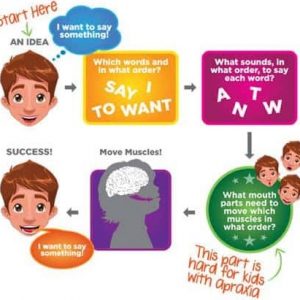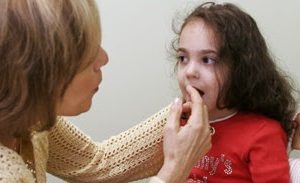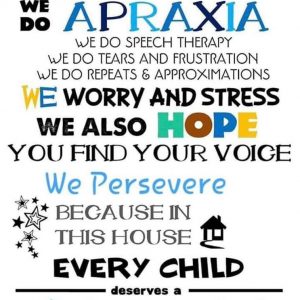
Childhood Apraxia of Speech (CAS) is an uncommon speech disorder in children. Unlike many speech disorders, CAS is not about muscle weakness. Apraxia of speech is when the brain is not sending the correct signals to the cheeks, tongue and lips. Children with the diagnosis of apraxia of speech generally have a good understanding of language and know what they want to say. However, they have difficulty learning or carrying out the complex sequenced movements that are necessary for intelligible speech. (Taken from Apraxia Kids website: https://www.apraxia-kids.org/) This is caused by a disconnect somewhere between the motor strip in their brain and the muscles in their tongue and mouth. Apraxia is not a childhood only diagnosis. It frequently happens in adults after a stroke or traumatic brain injury (TBI).
Parents of children with childhood apraxia of speech commonly say things like “No one can understand my daughter,” “It looks like she is trying to say a word but can’t get it out,” and “She said that word one time and then I never heard it again.”
Symptoms of Childhood Apraxia of Speech
Many of the symptoms of CAS are shared among several speech disorders making it difficult to pinpoint whether your child is dealing with apraxia of speech or something else altogether. Some common symptoms to look for are:
- Limited vocabulary
- Placing words in an incorrect order
- Small inventory of consonant or vowel sounds
- Vowel and consonant distortions
- Difficulty moving smoothly from one sound, syllable or word to another
- Pausing between syllables
- Struggling to imitate simple words or sounds
- Connected speech is extremely unintelligible
- Word production is not consistent
- The same word is produced different ways on different days
- Sometimes shorter words are more clear than longer ones
- Sounds are often distorted or substituted
- Abnormal syllable stress
- Planned/frequently used words or phrases come out more clearly
What Causes CAS?
The exact cause of CAS is unknown, but children are often born with it. Families with history of language and learning disabilities may be more likely to have children with childhood apraxia of speech. In some cases, CAS can onset after a significant injury or stroke.

Diagnosing Childhood Apraxia of Speech
With childhood apraxia of speech there is no medical test to determine with certainty that your child has it. Children also won’t grow out of CAS. It needs to be treated with a speech therapist to retrain the child’s brain to move facial muscles correctly.
Treatment is most often done by a pediatric speech therapist that specializes in CAS. It is important that the therapist you choose specializes in this disorder because apraxia of speech is notoriously hard to pinpoint and incredibly easy to misdiagnose. At Colorado Springs Therapy Center, our therapists specialize in CAS and have helped with many children who struggle with the disorder. Diagnosis starts with a comprehensive language test. We will assess your child’s language as well as speech motor skills. We will also look at your family history. You will answer questions about speech and learning disabilities present in your family line. This information helps our therapists discover the right diagnosis for your child.
Apraxia Treatment
The American Speech Language Hearing Association (ASHA) recommends therapy begin with 3-5x per week and can be reduced as progress is made. During therapy clients learn to correct motor patterns and create clearer, more intelligible speech. This is typically done through visual and tactile (touch) cues instead of auditory cues. Remember the disconnect in the motor path We talked about earlier? If the only direction a child with CAS is given is to “say it like this,” we are depriving them of the visual and tactile support they need to produce speech sounds accurately. A popular tactile approach is called PROMPT (Prompts for Restructuring Oral Muscular Phonetic Targets). This program assigns a hand signal or touch to each sound. For instance, the cue for “M” is a finger to the lips, a hand on the neck/throat, and a finger on the side of the nose. This shows the need for lip closure and that your voice should be “on,” and that the sound is nasal.
Our main goal is for your child to have a positive experience with speech communication so if any of the exercises are too overwhelming, we can use other forms of communication to help such as sign language, voice output communication tools and visual learning boards.

How Can I Help my Child?
While it may be frustrating to communicate with a child that cannot form words consistently or accurately, what they need most from you is your patience. Since most children with CAS know what it is they want to say, they are left feeling stuck and frustrated. Imagine knowing exactly what you want to say, but then hearing something incomprehensible come out of your mouth.
Be patient with your child and, when possible, don’t pressure them to speak. Be positive about their progress even though it may be slow. You want to avoid discouraging your child from speaking since consistent practice with a speech therapist is one of the only known ways to treat apraxia. Help others in your life know how to encourage and support your child as well. If your child feels safe and seen, they are more likely to practice improving their speech.
Find a support system whether it be another mom at the clinic you’re attending, a Facebook group, a blog writer, etc. Here are some Facebook pages, blog posts, success stories, and other resources:
- Facebook Page: Fighting for my Voice: My life with Verbal Apraxia
- Apraxia Kids
- “How My Child with Speech Apraxia Says I Love You”
- “Waiting on Words”
- “SLP Mommy of Apraxia”
If you believe your child may be struggling with childhood apraxia of speech or any other speech disorder, schedule a consultation with one of our trained pediatric therapists.
Legal
Information in this post on Apraxia came from the following:
- https://www.asha.org/public/speech/disorders/Childhood-Apraxia-of-Speech/
- https://promptinstitute.com/page/WIPforClincian
- My brain





